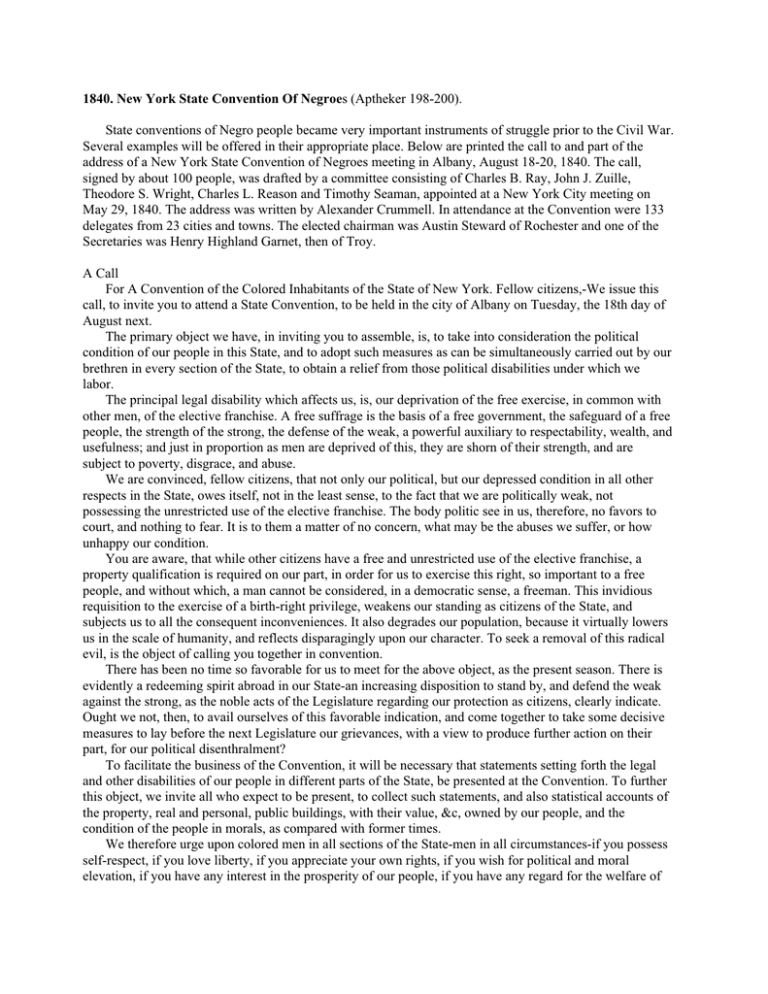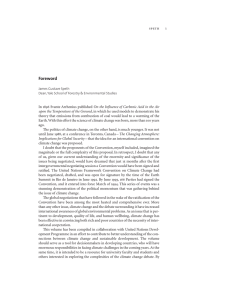1840. New York State Convention Of Negroe
advertisement

1840. New York State Convention Of Negroes (Aptheker 198-200). State conventions of Negro people became very important instruments of struggle prior to the Civil War. Several examples will be offered in their appropriate place. Below are printed the call to and part of the address of a New York State Convention of Negroes meeting in Albany, August 18-20, 1840. The call, signed by about 100 people, was drafted by a committee consisting of Charles B. Ray, John J. Zuille, Theodore S. Wright, Charles L. Reason and Timothy Seaman, appointed at a New York City meeting on May 29, 1840. The address was written by Alexander Crummell. In attendance at the Convention were 133 delegates from 23 cities and towns. The elected chairman was Austin Steward of Rochester and one of the Secretaries was Henry Highland Garnet, then of Troy. A Call For A Convention of the Colored Inhabitants of the State of New York. Fellow citizens,-We issue this call, to invite you to attend a State Convention, to be held in the city of Albany on Tuesday, the 18th day of August next. The primary object we have, in inviting you to assemble, is, to take into consideration the political condition of our people in this State, and to adopt such measures as can be simultaneously carried out by our brethren in every section of the State, to obtain a relief from those political disabilities under which we labor. The principal legal disability which affects us, is, our deprivation of the free exercise, in common with other men, of the elective franchise. A free suffrage is the basis of a free government, the safeguard of a free people, the strength of the strong, the defense of the weak, a powerful auxiliary to respectability, wealth, and usefulness; and just in proportion as men are deprived of this, they are shorn of their strength, and are subject to poverty, disgrace, and abuse. We are convinced, fellow citizens, that not only our political, but our depressed condition in all other respects in the State, owes itself, not in the least sense, to the fact that we are politically weak, not possessing the unrestricted use of the elective franchise. The body politic see in us, therefore, no favors to court, and nothing to fear. It is to them a matter of no concern, what may be the abuses we suffer, or how unhappy our condition. You are aware, that while other citizens have a free and unrestricted use of the elective franchise, a property qualification is required on our part, in order for us to exercise this right, so important to a free people, and without which, a man cannot be considered, in a democratic sense, a freeman. This invidious requisition to the exercise of a birth-right privilege, weakens our standing as citizens of the State, and subjects us to all the consequent inconveniences. It also degrades our population, because it virtually lowers us in the scale of humanity, and reflects disparagingly upon our character. To seek a removal of this radical evil, is the object of calling you together in convention. There has been no time so favorable for us to meet for the above object, as the present season. There is evidently a redeeming spirit abroad in our State-an increasing disposition to stand by, and defend the weak against the strong, as the noble acts of the Legislature regarding our protection as citizens, clearly indicate. Ought we not, then, to avail ourselves of this favorable indication, and come together to take some decisive measures to lay before the next Legislature our grievances, with a view to produce further action on their part, for our political disenthralment? To facilitate the business of the Convention, it will be necessary that statements setting forth the legal and other disabilities of our people in different parts of the State, be presented at the Convention. To further this object, we invite all who expect to be present, to collect such statements, and also statistical accounts of the property, real and personal, public buildings, with their value, &c, owned by our people, and the condition of the people in morals, as compared with former times. We therefore urge upon colored men in all sections of the State-men in all circumstances-if you possess self-respect, if you love liberty, if you appreciate your own rights, if you wish for political and moral elevation, if you have any interest in the prosperity of our people, if you have any regard for the welfare of your children, for the welfare of the State and of the nation, to assemble at Albany on the 18th of August next. We call upon the farmer to leave for a while his harvesting, and repair to the assemblage of his brethren. Let the mechanic leave his workshop, to share the toils of a general council. Let the laborer and the working man be seen crowding the avenues that lead to the place of assemblage. Let every portion of our great and growing State, where lives a single object of oppression, be represented. We call upon the people in every city, town, and village to represent themselves in that Convention. Let the aged and the youth-all-all-be found at the above place, on that day. Come up, fellow ~ citizens, from Suffolk to Erie, from Clinton to Steuben, and let us engage together in a common interest. The Address ...We have been deprived of the elective franchise during the last twenty years. In a free country, this is ever a stimulant to enterprise, a means of influence, and a source of respect. The possession of it sends life, vigor, and energy through the entire heart of a people. The want of it in a community, is the cause of carelessness, intellectual inertness, and indolence. Springing above all these depressing circumstances, and exerting ourselves with unwonted alacrity, by native industry, by the accumulation of property, we have helped contribute, to a considerable extent, not only to the means of the State, but likewise to its character and respectability. We claim, that there is no consideration whatever in existence, on at... count of which, the odious proscription of which we complain, should be continued. The want of intelligence, our misfortune, and the crime of others, which was once urged against us, does not now exist. Again: we are the descendants of some of the earliest settlers of the State. We can trace our ancestry back to those who first pierced the almost impenetrable forests that then lifted their high and stately heads in silent grandeur to the skies. When the vast and trackless wilderness, that had alone answered to the fierce roar of the roaming beast, or the whoop of the wild native, spread itself before the earlier settlers, our fathers were among those, who, with sinewy frame and muscular arm, went forth to humble that wilderness in its native pride. Since that time, our fathers, and we ourselves, have lent our best strength in cultivating the soil, in developing its vast resources, and contributing to its wealth and importance. Those who are the least acquainted with the history of the State, cannot but grant, that in this respect we have contributed more than our proportionate part.




